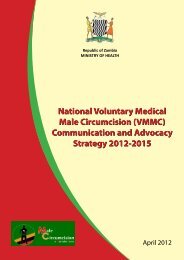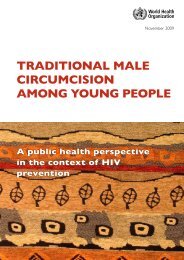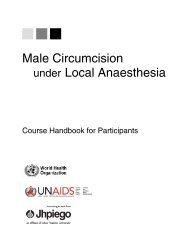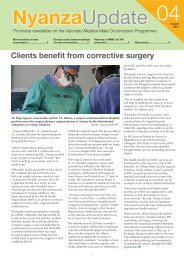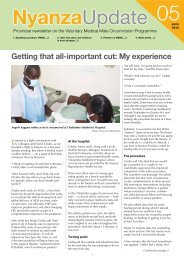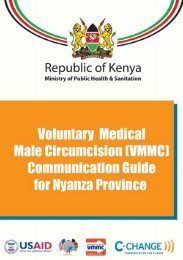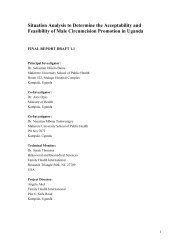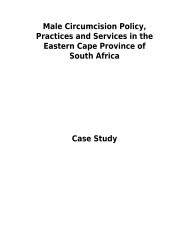Manual for Male Circumcision under Local Anaesthesia
Manual for Male Circumcision under Local Anaesthesia
Manual for Male Circumcision under Local Anaesthesia
Create successful ePaper yourself
Turn your PDF publications into a flip-book with our unique Google optimized e-Paper software.
<strong>Male</strong> circumcision <strong>under</strong> local anaesthesia Version 2.5C (Jan08)<br />
• male circumcision <strong>for</strong> men who choose to have the procedure;<br />
• in<strong>for</strong>mation and counselling on sexual intercourse, safer sex,<br />
and health problems related to the reproductive system;<br />
• diagnosis and management of sexually transmitted infections;<br />
• counselling and testing <strong>for</strong> HIV and AIDS and referral <strong>for</strong> care<br />
and support;<br />
• contraception, through vasectomy or the use of condoms;<br />
condoms will prevent both pregnancy and infections (dual<br />
protection).<br />
Physical and sexual maturity comes with many social responsibilities.<br />
These include:<br />
• Recognizing that safer sex can prevent STIs and HIV<br />
infection. Safer sex includes using condoms correctly and<br />
consistently, reducing the number of sexual partners, delaying<br />
the start of sexual relations, and avoiding penetrative sex.<br />
• Never putting yourself in a situation in which you lose control<br />
of your judgement, <strong>for</strong> example because you are <strong>under</strong> the<br />
influence of alcohol or drugs. This may lead to behaviour that<br />
will increase your risk of becoming infected with STIs and HIV,<br />
such as having unprotected sexual intercourse with strangers<br />
or with multiple sexual partners.<br />
• Treating women as equal partners in sexual relations and<br />
deciding together whether and when to have children.<br />
• Respecting the sexual and reproductive health rights of<br />
teenage girls and women, including the right to refuse sexual<br />
intercourse, both within and outside marriage.<br />
• Supporting women’s sexual and reproductive health and<br />
children’s well-being, with equal regard <strong>for</strong> female and male<br />
children. Such support is particularly important during<br />
pregnancy.<br />
• Stopping gender-based violence against women and girls,<br />
and not <strong>for</strong>cing or coercing girls or women to have sex against<br />
their will.<br />
<strong>Male</strong> circumcision<br />
For those of you who are here to find out more about male<br />
circumcision, let’s talk a bit about that.<br />
• What is male circumcision? <strong>Male</strong> circumcision is the surgical<br />
removal of the <strong>for</strong>eskin of the penis (also called the prepuce). It is<br />
one of the oldest surgical procedures in history.<br />
• <strong>Male</strong> circumcision has been shown to have several health benefits<br />
including:<br />
• a reduced risk of urinary tract infections in childhood;<br />
• a reduced risk of some sexually transmitted infections, such as<br />
herpes and syphilis;<br />
• some protection against cancer of the penis;<br />
• a reduced risk of cervical cancer in female sex partners;<br />
• prevention of several medical problems of the penis and<br />
<strong>for</strong>eskin, such as inflammation, scarring and swelling of the<br />
<strong>for</strong>eskin (balanitis, phimosis and paraphimosis).<br />
Educating and Counselling Clients and Obtaining In<strong>for</strong>med Consent Chapter 3-3<br />
<strong>Male</strong> circumcision <strong>under</strong> local anaesthesia Version 2.5C (Jan08)<br />
• Some of you may have heard that male circumcision reduces the<br />
risk of HIV infection. This is correct. However, I must remind you<br />
that male circumcision does not protect completely against HIV<br />
infection – it only reduces the risk of becoming infected. It is very<br />
important to continue using other ways of reducing the risk of<br />
infection – using condoms correctly and consistently, reducing the<br />
number of sexual partners, delaying the start of sexual relations,<br />
avoiding penetrative sexual intercourse, and avoiding unsafe<br />
injections.<br />
• As with any surgical procedure, complications may occur after the<br />
operation. However, in our clinic we do everything we can to<br />
reduce this risk. Possible problems include pain, bleeding, swelling<br />
of the penis caused by bleeding <strong>under</strong> the skin (haematoma),<br />
infection of the surgical wound, and increased sensitivity of the<br />
exposed head of the penis (glans). On average, if we operate on<br />
50 men or boys, one will need to come back to the clinic <strong>for</strong> the<br />
treatment of a complication. However, the problems usually settle<br />
down quickly with additional treatment.<br />
• Many men ask how soon after circumcision sexual intercourse can<br />
be resumed. It takes about 4 to 6 weeks <strong>for</strong> the wound to become<br />
strong enough to withstand sexual intercourse and about 3–4<br />
months <strong>for</strong> the wound to heal completely. We always advise<br />
clients to avoid sexual intercourse or masturbation <strong>for</strong> the first 4–6<br />
weeks after circumcision, and to use a condom during sexual<br />
intercourse until the wound has completely healed (at least 6<br />
months). It is always best to use a condom whenever there is any<br />
risk of HIV infection.<br />
• At this clinic, we per<strong>for</strong>m circumcision as a day case. We use local<br />
anaesthesia to take away the pain of the procedure. Patients can<br />
go home the same day but it is important that they come back <strong>for</strong><br />
follow-up.<br />
• Do any of you have any questions or concerns about male<br />
circumcision? I know that there are many myths about male<br />
circumcision that circulate. For example, some people think that<br />
circumcision can cause impotence (failure of erection) or reduce<br />
sexual pleasure. Others think that circumcision will cure<br />
impotence. Let me assure you that none of these is true.<br />
If time permits, other sexual and reproductive health topics can be<br />
covered (see Appendix 3.1).<br />
Summary<br />
We have talked about the different services that we offer in this clinic.<br />
It is up to you to let us know what services are of interest to you. If you<br />
are worried that you may be infected with an STI or HIV, or if you want<br />
to be tested, counselling and testing services are available here. If you<br />
want to register yourself or your son <strong>for</strong> circumcision, please let us<br />
know. We will be very pleased to assist you in any way you wish.<br />
Please take some of the in<strong>for</strong>mation leaflets we have here. They may<br />
answer other questions that you may have. Thank you <strong>for</strong> your<br />
attention.<br />
Educating and Counselling Clients and Obtaining In<strong>for</strong>med Consent Chapter 3-4




